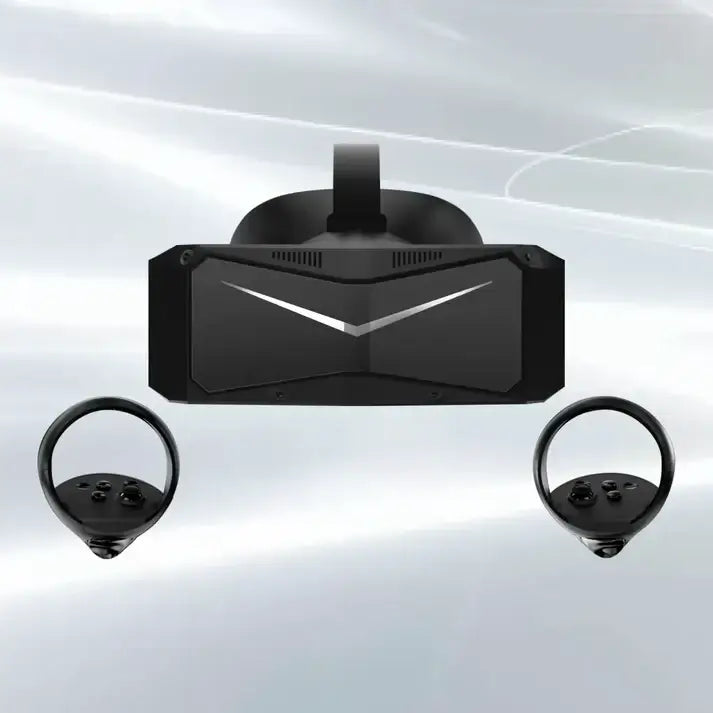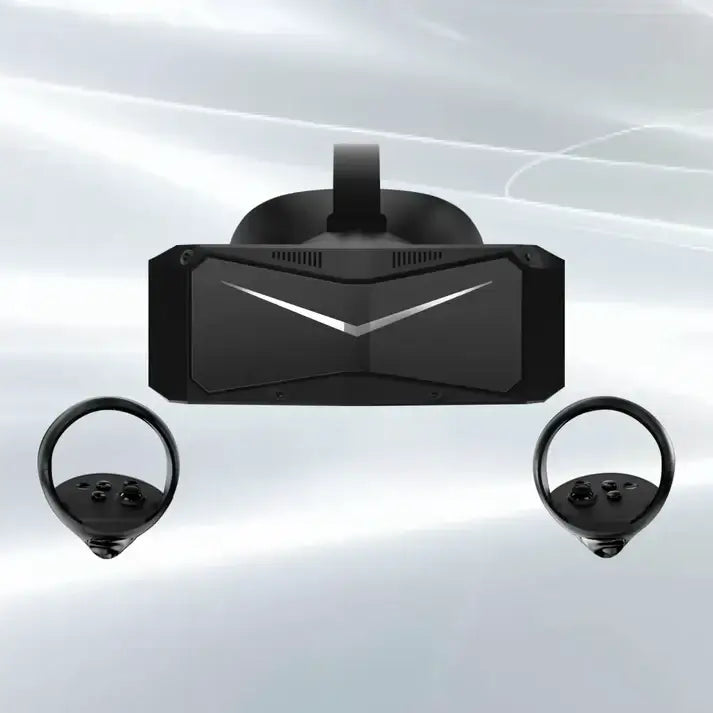Dans cette revue, pixelconnect explore les fonctionnalités, les performances et la facilité d'utilisation du casque VR Pimax Crystal Light, en se concentrant sur son application dans les courses de simulation. L'article explore les points forts du casque et les domaines à améliorer. Vous trouverez ci-dessous une traduction en anglais de l' article original et de la critique vidéo sur YouTube .
Pimax Crystal Light en pratique
Dans le monde du sim racing, la réalité virtuelle est une alternative intéressante. Le Pimax Crystal Light, testé avec l'empattement Moza R16 et le volant Moza KS, est le successeur du Pimax Crystal. Ce casque fonctionne exclusivement avec un PC et dispose de quatre caméras pour suivre les mouvements de la tête et du contrôleur. Des lentilles asphériques en verre, plutôt que des lentilles de Fresnel, garantissent une qualité d'image élevée sans stries ni reflets. La distance des lentilles est réglable (IPD de 58 mm à 72 mm), offrant un bon champ de vision à 102°.
Le casque est doté d'un écran QLED lumineux avec des taux de rafraîchissement de 72, 90 ou 120 Hz et une résolution de 2 880 x 2 880 pixels par œil. Cela surpasse des concurrents comme le HP Reverb G2 et le Meta Quest 3. Compatible avec SteamVR et OpenXR, il prend en charge les simulations de course PC populaires comme Assetto Corsa Competizione, iRacing, F1 24 ou Automobilista 2. Le casque est confortablement rembourré autour des yeux et de l'arrière de la tête, ce qui est nécessaire compte tenu de son poids de plus de 800 grammes. Un réglage correct des bandeaux de tête et de front est essentiel pour le confort.
Avantages du Sim Racing
Le Pimax Crystal Light excelle dans les courses de simulation, en exploitant pleinement les avantages d'un casque VR. Il plonge les utilisateurs directement dans le cockpit, ce qui permet une liberté de mouvement pour suivre les adversaires et mieux voir les virages. Cela est particulièrement bénéfique pour les virages serrés ou la conduite de rallye, car la fin des courbes est souvent plus visible que sur un écran plat.
La fonction de gradation locale améliore l'expérience en permettant à l'écran QLED de s'assombrir sur quatre niveaux, ce qui rend les zones sombres vraiment sombres. Cela est particulièrement avantageux pour les courses de nuit sur de longues pistes comme la Nürburgring Nordschleife ou Le Mans.
Variantes de la lampe Pimax Crystal Light
Le casque est disponible en trois variantes :
-
Pimax Crystal Light avec gradation locale (variante testée) - Prix : 769 €
-
Lampe Pimax Crystal avec variateur local et contrôleur VR - Prix : 859 €
-
Pimax Crystal Light sans Local Dimming (pas encore disponible) - Prix : 650 €
Problèmes avec le casque
Le Pimax Crystal Light n'est pas exempt de défauts. Le câble de connexion est relativement rigide et épais, mais sa longueur de 5 mètres est suffisante pour une liberté de mouvement. Le casque nécessite trois connexions : DisplayPort, USB 3.0 et alimentation via un adaptateur séparé. Le suivi fonctionne bien dans une pièce suffisamment éclairée, mais peut subir des interruptions dans le cas contraire. La zone de sécurité a nécessité un recalibrage fréquent pendant les tests, se déplaçant souvent lorsque le casque était repositionné. Les haut-parleurs intégrés sont fonctionnels, mais un casque supra-auriculaire est recommandé pour une meilleure qualité sonore.
Conclusion
Le Pimax Crystal Light est un casque techniquement avancé, particulièrement remarquable pour sa qualité d'image. Sa haute résolution et sa gradation locale offrent une expérience VR nette et à contraste élevé, nécessitant un PC de jeu moderne pour des graphismes fluides. Associé à un volant, un siège de course et des pédales, il offre une expérience véritablement immersive qui ressemble à une course professionnelle. La réalité virtuelle offre également une meilleure perception de la situation sur la piste et permet d'évaluer les conditions de piste et la trajectoire de course idéale.
Pour un aperçu plus détaillé, visitez le site Web de pixelconnect pour lire la critique complète dans son format original.
Si vous avez des questions sur la configuration, n'hésitez pas à rejoindre notre groupe Discord. Nous organisons fréquemment des sessions de questions-réponses et vous pouvez poster vos questions dans les canaux correspondants. Pour toute assistance liée à Discord, contactez Max à Max.Semak@Pimax. Vous pouvez rejoindre notre groupe Discord ici : Discord Channel . Pour une assistance technique, vous pouvez également contacter Emily à emily.wang@pimax.com ou soumettre un ticket ici : Support Ticket . Pour plus de détails sur la Pimax Crystal Light, veuillez visiter la page produit ici .
























